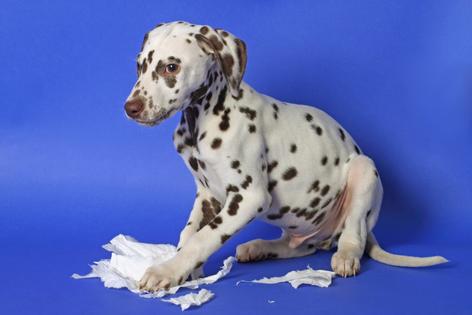My Pet World: Potty troubles — puppy accidents and litter box blues
Dear Cathy,
Our almost five-month old Dalmatian has accidents in the house yet always goes outside to defecate. He is walked every half hour, but will urinate immediately after coming inside, in his pen, and when he’s being held.
While outside, he will urinate while walking back inside. He has completed vet prescribed antibiotics with no effect. We have a 13-month-old American Bully who is fully trained.
— Lori, Calverton, New York
Dear Lori,
Given that he consistently urinates indoors despite frequent trips outside, this may be more than just a training issue. Since a urinary tract infection has already been ruled out, I recommend checking with your vet again to explore other medical possibilities, such as urinary incontinence or an issue with bladder control.
If everything checks out, then this may be a behavioral issue tied to incomplete training, excitement/submissive urination, or anxiety. Since he urinates when being held, he could be displaying submissive urination, which is common in young dogs. Try keeping greetings calm and low-key to see if that reduces the issue.
Next, it may help to extend his time outside. Some puppies don’t fully empty their bladders (especially male dogs who like to leave a little in the bladder to mark things later). So instead of heading back in right after he urinates, stay outside a little longer to encourage a second round of relieving himself.
You might also take him to different spots in the yard, as a change in location can sometimes prompt another attempt. I would begin training him to "go potty" by pairing the phrase with the act of going potty, so you can tell him what you want him to do when he goes outside. He will learn what this means.
Since you already have a fully trained dog living in the home, your new puppy may also (eventually) pick up good habits by watching his housemate. But for now, rule out any other medical concerns and reinforce the idea that outside is the only place to go through training. Give high value treats and praise every time he gets it right.
Dear Cathy,
My grandparents came across your column in the newspaper and forwarded it to me. I am hoping you can help us with our cat, Millie. We inherited her after my father-in-law passed away. She was a rescue from a humane society and, from what we’ve been told, has always had issues using the litter box.
She consistently pees and poops outside the box. We have three litter boxes for her and our other cat and keep them clean. We have tried different types of litter too. A vet confirmed she has no infections or medical issues. We love her – she’s the sweetest, most affectionate cat – but we’re struggling to get her to use the litter box. What can we do?
— Samantha, Pittsburgh, Pennsylvania
Dear Samantha,
You've already taken important steps by ruling out medical issues, providing multiple litter boxes, and experimenting with different litter-types. To further encourage proper litter box use, make sure the boxes are in quiet, low-traffic areas, away from loud appliances or frequent disturbances. If they are in dimly lit areas, add a nightlight nearby. Also, avoid cleaning litter boxes with citrus-scented products, as these scents are deterrents to cats.
Next, try different box styles – such as a larger, uncovered, or lower-entry option – to see if it helps her feel more comfortable. You might also try sprinkling a litter box attractant to draw her back to the box. Small adjustments like these can make a big difference.
If needed, temporarily confining her to a quiet space with her litter box, food, and water may help reinforce good habits, though this step may not be necessary for an issue that has persisted long-term. Because territorial concerns can also be a factor, make sure both cats have enough space, perches, and separate feeding areas to minimize competition.
Stress plays a major role in litter box issues, and the recent changes in her life — losing her owner and adjusting to a new home — may also contribute to her anxiety. Environmental factors like new furniture, flooring, or household scents can also influence her habits.
Establishing a consistent routine with regular feeding and playtime can help. Engage her in interactive play at least three times a day for five to 10 minutes at a time to reduce stress and strengthen your bond. Additionally, feline pheromone diffusers, collars, and sprays for multi-cat households can create a calming foundation.
Finally, avoid punishment, as it can increase anxiety and make the issue worse. Instead, reward her with treats or praise when she uses the litter box correctly.
_____
_____
========
(Cathy M. Rosenthal is a longtime animal advocate, author, columnist and pet expert who has more than 25 years in the animal welfare field. Send your pet questions, stories and tips to cathy@petpundit.com. Please include your name, city, and state. You can follow her @cathymrosenthal.)
©2025 Tribune Content Agency, LLC.
(c) 2025 DISTRIBUTED BY TRIBUNE MEDIA SERVICES, INC.












Comments